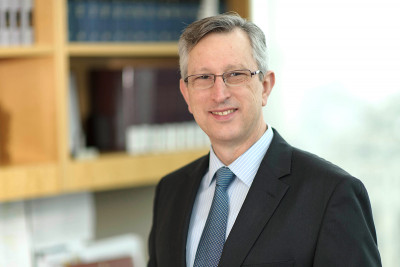
Renowned cancer biologist Joan Massagué, PhD, has been named Director of the Sloan Kettering Institute, one of the most dynamic and robust cancer research programs in the United States, and the research arm of Memorial Sloan Kettering Cancer Center. Dr. Massagué, Chair of the Cancer Biology and Genetics Program at Memorial Sloan Kettering, succeeds Thomas J. Kelly, MD, PhD. Dr. Massagué will assume his new position on January 1, 2014.
“Dr. Massagué is an exemplary scientist and an international leader in the study of cancer metastasis and the growth factors that regulate cell behavior. He is one of Memorial Sloan Kettering’s most vital, imaginative, and collaborative members,” said Craig B. Thompson, MD, President and CEO of Memorial Sloan Kettering. “He led the Sloan Kettering Institute’s Cell Biology Program and its Cancer Biology and Genetics Program, successively – and brilliantly – even as his own research was advancing. I am delighted that he will now lead the Sloan Kettering Institute, confident that he will do so with great distinction. The breadth of Dr. Massagué’s expertise and his superb ability to bring people together will ensure that the Sloan Kettering Institute continues to flourish and remains one of the world’s preeminent research institutions.”
The Sloan Kettering Institute was established in 1945 by philanthropist Alfred P. Sloan and inventor Charles F. Kettering with the vision of harnessing the latest research techniques to conquer cancer. With a research staff that today includes more than 100 laboratory investigators, 550 research fellows, and 260 graduate students — and with $184 million in grants and contracts revenue — the Institute leads the way in biomedical research, frequently translating scientific advances into innovative clinical applications, including the development of nine FDA-approved drugs.
Joan Massagué was born in Barcelona, Spain, in 1953. He earned his PhD in pharmacy and biochemistry from the University of Barcelona in 1978 and completed a postdoctoral fellowship at Brown University in 1982 in the laboratory of Michael P. Czech, PhD, where he determined the structure of the receptor for the hormone insulin. Later that year, he became an assistant professor in biochemistry at the University of Massachusetts. In 1989, he joined Memorial Sloan Kettering as the Chair of the Sloan Kettering Institute’s Cell Biology Program and in 2003 was named inaugural Chair of the Cancer Biology and Genetics Program. Dr. Massagué has been a Howard Hughes Medical Institute investigator for the past 24 years, and is the incumbent of the Alfred P. Sloan Chair at Memorial Sloan Kettering.
With a research career spanning more than 30 years, Dr. Massagué has been lauded for the originality and importance of his work elucidating the mechanism of action for transforming growth factor-beta (TGF-β) signaling. The TGF-β family of proteins plays a key role in the proliferation and differentiation of many different cell types, controlling the formation and regeneration of tissues from embryonic life to adulthood.
Because the proteins can both inhibit and activate cell growth, breakdowns in TGF-β activity cause cancer in adults as well as serious birth defects. In cancer, TGF-β can act as a tumor suppressor in early stages of cancer and as a promoter of the spread of cancer in the later stages of tumor progression. To find ways to prevent and treat such disorders, Dr. Massagué and his group are determining the molecular processes by which TGF-β exerts its control on the growth and behavior of diverse cell types.
More recently, Dr. Massagué’s primary research interests involve how growth factors, signaling pathways, and gene expression programs control cancer cell metastasis — the process by which cancer spreads from one part of the body to another. Metastasis is the cause of 90 percent of deaths from cancer, yet until recently, little was known about its underlying mechanisms.
“I am honored beyond words by the trust Memorial Sloan Kettering has placed in me to lead the Sloan Kettering Institute and serve it in its quest to bring top-quality science to bear on solving the problem of cancer,” said Dr. Massagué. “We have many of the most gifted scientists and one of the best science programs in the nation. I look forward to cultivating this rich diversity of research disciplines in order to maximize their impact on the research, education, and patient care missions of the institution at large. One of the attractions of this position is that it involves thinking about where science is going, where the Sloan Kettering Institute should be going, and planning for an exciting future. I am eager to work with my colleagues to move forward the frontiers of cancer biomedical research.”
A member of the Institute of Medicine and the National Academy of Sciences, Dr. Massagué has received numerous honors and awards, including the King Juan Carlos I Research Award (1993); the Prince of Asturias Award in Science and Technology (2004); the Vilcek Prize for Biomedical Research (2006); the Passano Laureate Award (2007); the G.H.A. Clowes Memorial Award from the American Association for Cancer Research (2009); the Frontiers of Knowledge Award in Biomedicine from the BBVA Foundation (2009); the Feodor Lynen Medal (2010); the Pasarow Award for Cancer Research (2011); and the Italian American Cancer Foundation Prize (2013).
Dr. Massagué has authored more than 300 scientific articles and has been one of the most-cited researchers in all areas of science in the past two decades. In addition, he has mentored and trained more than 100 graduate students and postdoctoral fellows.